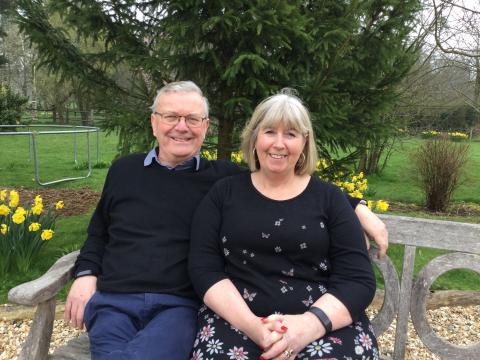
Why did you want to become Foster Carers?
Liz: Martin had taken early retirement and both of our boys had left home. I used to be quite a busy mum but suddenly I didn’t have so much to do with my time. We’ve always had an open house, full of children and I was bought up in that way too. So when the children left, I thought what am I going to do? I didn’t want to go into retirement because I didn’t feel old enough. We had great ideas; we were going to travel the world and we actually did spend some time abroad. Then I heard a radio advert about fostering, which is how it all began!
Martin: I’d sold my business a couple of years previously, and then experienced this change in lifestyle. I went from being extremely busy, devoting my time between my family and my work commitments, to finding I had a list of things to do that were quick to complete, leaving me in a void when I’d finished. I missed the challenge of problem solving, of dealing with people and talking to people, and I found I was becoming very insular and very boring probably! So Liz and I had a discussion about what we were going to do with our lives. We wondered whether we should travel, or whether we should do other things, then fostering came up! Liz told me all about it, and I sat back and thought I don’t know if I can do this, this is a hec of a challenge, do I really think I can do it? I had to think about it for a long long time. I didn’t want to start anything and risk letting a child down.
What is it that you enjoy about fostering teenagers?
Liz: For me, it’s also the most familiar stage of parenting because our sons are now in their twenties. It doesn’t seem that long ago that they were teenagers.
Martin: Teenagers are exploring where they want to go and they’re discovering what they want to do with their life. They’re very vocal about what they want to do; why you’re wrong and why they’re right. They’re very interesting to talk to because they’ve got ideas that make you sit up and think maybe they’re right, maybe I’m stuck in my ways. And it’s refreshing!
Liz: Having teenagers keeps you young, it’s got me back into real life! We tend to take children that have challenging behaviours because we like a challenge but for me it’s also really important to get to know the child. If I don’t know them, I don’t feel I can help them. You’ve got to be very open-minded when you do face a challenge. It breaks my heart inside, but you can’t show that. And you need to be non-judgemental, that’s really important; you cannot judge because you haven’t experienced the situation and can’t know what it’s like. We can only imagine.
What do you find rewarding about fostering?
Liz: For me it’s the little steps that can be very rewarding; for example a hug, if they get to know you and learn to trust you.
Martin: It’s rewarding when they open up. When they arrive, they don’t trust you. Perhaps the child is very reserved because of the journey they’ve been on. After a period of time they’ll start opening up and you’ll start realising they can give you enjoyment and companionship. I set myself little challenges. I can think of a particular case where a child would only eat 3 or 4 items of food. Over a period of time, we introduced other foods, and gradually, she began to eat green vegetables, potatoes and pasta. It’s little steps.
How did you find the assessment process?
Liz: It bought up things from my past that I didn’t even realise were lurking in the back of my mind. But I’ve got to say it was in a very good way. It was very therapeutic and in fact I wish I’d done it years ago. It highlighted things I’d been doing my whole life, and once I finished I thought I’m not doing that any more. One of the things that came out for me is that I can’t make everything right for everybody. I wish I’d gone through the process years ago. I learnt an awful lot about myself.
Tell us about your first placement. How did you prepare?
Liz: When we found out about our first placement, my heart was pounding, I was so nervous! I try to think how I would feel walking through a stranger’s door and not knowing what’s on the other side. Can you imagine what it must feel like for a young person? But actually, when they got here it was fine. I always say to the children we get as nervous as you do!
Have you experienced any prejudice?
Martin: When I ask people have you ever thought about fostering? Do you think it’s something you can do? There’s usually a sharp intake of breath…. I can’t do that; they’re children with problems, children who are naughty. And I’ve said, no they’re not! They’re children who’ve had a poor start in life, and you can offer them a whole host of support to help them on their journey to a better future.
How have you found the support?
Liz: The support we’ve had has been second to none; we’ve got the most wonderful Supervising Social Worker
Martin: She knows exactly how much to give us, she’s neither in our face, nor to distant. We’ve certainly not been isolated
Liz: She keeps in contact with us and we have regular meetings. She really understands us as a couple. The one thing I absolutely love is that when we have meetings, we’re bought into it as though we are part of the Brighton & Hove team, as though we work in the office with them. It’s really important to have a good team behind you.
What advice would you give to others thinking of fostering?
Liz: Fostering has got its challenges, but on the whole it’s really good fun! I’m not just saying that as a cliché, I have really, really enjoyed it. Especially the past year, and the journey I’ve been on with the teenagers in our care. We’ve laughed; we’ve had lots of laughs. You’ve got to have a good sense of humour and fostering makes me really happy.
Martin: Think of the challenges but also the rewards, because the rewards are so important. It doesn’t matter whether you think you’re going to fail. There is support in the system to help you. You will be surrounded by professionals, who are more than able, and very willing, to come to you and help you. If you feel like screaming and you’re pushed to the limits, there is always somebody at the end of the phone who can help you
Liz: You have to have a love for children. And you have to be a people person. When you get a referral, ask as many questions as you can. Social Workers try to give you as much information as they can, but a child’s life story is more than words on a page. How a child behaves with one family is not necessarily how they will behave with another, because we’ve all got different personalities. Forget about all the little challenges, you’re likely to have them with your own kids anyway. And in fact, I find it easier to deal with young people that are not my own children. I should have gone through Skills to Foster before I had my own children, because it taught me so much! I treat the children in our care as though they are part of our family, and that is really important. They should feel they belong to the family group.
Martin: Fostering keeps you young. It stops you vegetating. You’re physically and mentally active and that has been something that fits into my way of life. It fulfils my needs as much as the children’s.
***
Due to Coronavirus, our team our working remotly, but we are continuing to welcome fostering enquiries and applications because there remains a priority need for children to have safe and loving foster families. We are conducting information sessions, initial enquiries and home visits via WhatsApp and Skype, and we are working closly with new applicants to progress their applications.
Please e-mail fosteringrecruitment@brighton-hove.gov.uk for details of our next virtual information session.
Find out more about fostering by downloading our information booklet
Please do like our Facebook page and follow us on Twitter and Instagram – you will be able to keep up to date with our news, training events, school holiday activities and wonderful community spirit.

